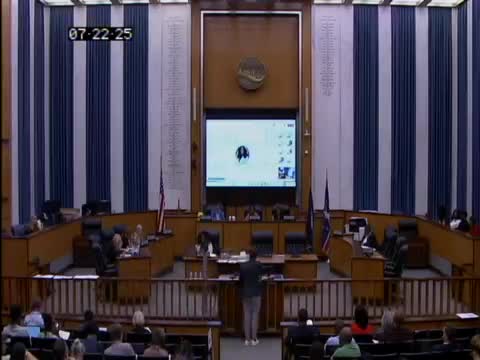City Council Advances Main Street Program for Broad Street Corridor Improvements
July 22, 2025 | Richmond City (Independent City), Virginia
This article was created by AI summarizing key points discussed. AI makes mistakes, so for full details and context, please refer to the video of the full meeting. Please report any errors so we can fix them. Report an error »

In a recent meeting of the Richmond City Land Use, Housing, and Transportation Standing Committee, significant steps were taken to enhance community development and pedestrian safety. The committee approved a resolution to apply for the Virginia Department of Housing and Community Development's (DHCD) Main Street program, targeting the Broad Street Corridor. This initiative, which involves a $375 annual fee for technical assistance and community engagement, aims to designate the area as a Main Street, potentially expanding to other corridors in the future.
Acting Director of Economic Development, Matt Welch, emphasized the importance of this program, noting that it marks the city's first attempt to engage in such a comprehensive community development effort. The initiative is expected to take three to five years to fully implement, with the goal of revitalizing the Broad Street area and fostering economic growth.
In addition to the Main Street program, the committee also supported a resolution to apply for funding from VDOT's Transportation Alternatives Program. This project focuses on pedestrian safety improvements along Patterson Avenue, specifically between Maple Avenue and Libby Avenue. Proposed enhancements include ADA-compliant curb ramps, sidewalk reconstruction, bike racks, and landscaping to reduce conflicts between pedestrians and vehicles. The total project cost is estimated at $1.44 million, with the city seeking $1 million in federal funds to cover 80% of the expenses.
City Engineer M. Khairat highlighted that this project aligns with the city's Vision Zero Action Plan, aimed at improving safety on high-injury streets. The committee's approval of both resolutions reflects a commitment to enhancing community infrastructure and safety, addressing pressing needs for residents.
As Richmond moves forward with these initiatives, the community can anticipate positive changes that will not only improve safety but also promote economic development in key areas of the city.
Acting Director of Economic Development, Matt Welch, emphasized the importance of this program, noting that it marks the city's first attempt to engage in such a comprehensive community development effort. The initiative is expected to take three to five years to fully implement, with the goal of revitalizing the Broad Street area and fostering economic growth.
In addition to the Main Street program, the committee also supported a resolution to apply for funding from VDOT's Transportation Alternatives Program. This project focuses on pedestrian safety improvements along Patterson Avenue, specifically between Maple Avenue and Libby Avenue. Proposed enhancements include ADA-compliant curb ramps, sidewalk reconstruction, bike racks, and landscaping to reduce conflicts between pedestrians and vehicles. The total project cost is estimated at $1.44 million, with the city seeking $1 million in federal funds to cover 80% of the expenses.
City Engineer M. Khairat highlighted that this project aligns with the city's Vision Zero Action Plan, aimed at improving safety on high-injury streets. The committee's approval of both resolutions reflects a commitment to enhancing community infrastructure and safety, addressing pressing needs for residents.
As Richmond moves forward with these initiatives, the community can anticipate positive changes that will not only improve safety but also promote economic development in key areas of the city.
View full meeting
This article is based on a recent meeting—watch the full video and explore the complete transcript for deeper insights into the discussion.
View full meeting
